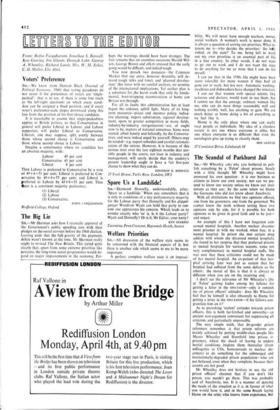E
U
From: Robin Farquharson, Jonathan S. Boswell, Ken Geering. Iris Glover, Oonagh Lahr, George A. Wheatley, Richard Lamb, Mrs. W. M. Sykes, C. H. Mellor, Elie Abel.
Voters' Preference
SIR,—We know from Duncan Black (Journal of Political Economy. 1948) that voting paradoxes do not occur if the preferences of voters are 'single- peaked': that is to say, if there is some line (such as the left-right spectrum) on which every candi- date can be assigned a fixed position, and if every voter's preference-scale slopes downward along this line from the position of his first-choice candidate.
It is reasonable to assume that single-peakedness applies to British politics, so that Conservatives in general will prefer Liberal to Labour, and Labour supporters will prefer Liberal to Conservative. Liberals, one may suppose, split evenly between those whose second choice is Conservative and those whose second choice is Labour.
Imagine a constituency where no candidate has an absolute majority, with :
Labour 49 per cent Conservative 43 per cent Liberal 8 per cent Then Labour is preferred to Conservative by a vote of 49+4=53 per cent; Liberal is preferred to Con- servative by 49+8=57 per cent; and Liberal is referred to Labour by 43+8=51 per cent. Thus *ere is a consistent majority preference: (1) Liberal (2) Labour (3) Conservative.
Nuffield College, Oxford
ROBIN rARQUHARSON


































 Previous page
Previous page